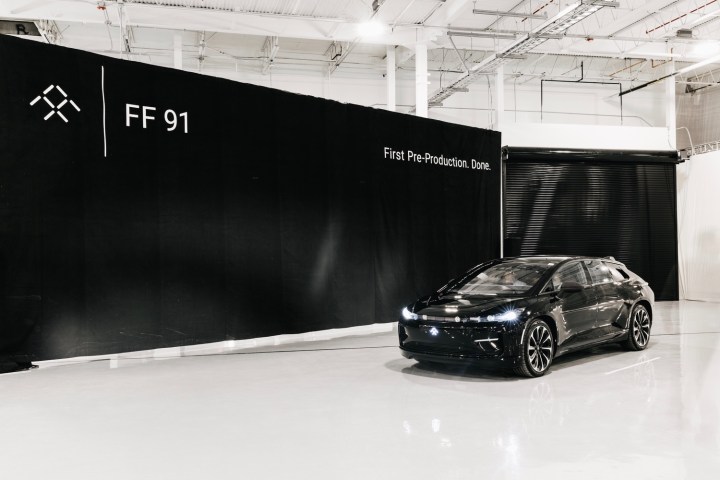 Faraday Future has completed the first preproduction version of its FF 91 crossover, marking an important milestone for the troubled electric-car startup. Faraday also announced that it is pushing back the start of customer deliveries from the end of 2018 to the first half of 2019, which still doesn’t leave much time to ramp up production.
Faraday Future has completed the first preproduction version of its FF 91 crossover, marking an important milestone for the troubled electric-car startup. Faraday also announced that it is pushing back the start of customer deliveries from the end of 2018 to the first half of 2019, which still doesn’t leave much time to ramp up production.
The FF 91 was unveiled at CES 2017, and quickly gained attention thanks to some impressive specifications. Faraday boasted of 1,050 horsepower, 0 to 60 mph in 2.3 seconds, and a 378-mile range. Later in 2017, the FF 91 stretched its legs at the Pikes Peak International Hill Climb, a legendary race up a Colorado mountain. But Faraday has struggled to get the FF 91 into production.
The automaker initially relied on Chinese entrepreneur Jia Yueting’s LeEco tech company for funding. But when LeEco experienced financial problems, so did Faraday. The automaker abandoned plans for a brand-new factory in North Las Vegas, Nevada, opting to repurpose an old Pirelli tire factory in Hanford, California, instead. Staff began departing en masse and Jia, who is now Faraday’s CEO, had assets in his home country frozen.
However, Faraday has made progress recently. In June, the company announced a $2 billion investment from China’s Evergrande Healthy Investment Group Limited. Evergrande received a 45-percent stake in Faraday as part of the deal. Work at the Hanford factory has also progressed rapidly. Faraday began construction in March, fitted the first assembly-line equipment in June, and completed the first FF 91 body shell in late July.
In order to ramp up production, Faraday claims to be on a hiring spree. The company expects its Hanford factory to create up to 1,000 jobs, and is working with the College of the Sequoias on training new hires. In a press release, Faraday said it is also working with local community colleges to devise a management-training curriculum.
The first preproduction FF 91 is an indication that Faraday has a future, but the company still faces challenges. Ramping up to full-scale production will be a lot more difficult than building one car. Faraday also has competition from Tesla, as well as newer startups like Lucid Motors, Nio, and Byton, and legacy automakers who are introducing their own luxury electric cars. Despite the number of new car companies that have cropped up over the last few years, the car business remains expensive and complicated.


